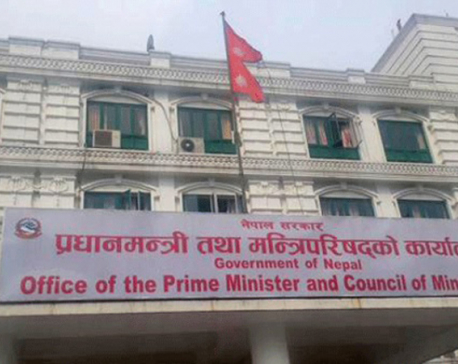
OR
TRC still faces mountain of work with one month before term ends
Published On: December 31, 2016 07:30 AM NPT By: Nabin Khatiwada
KATHMANDU, Dec 31: The Truth and Reconciliation Commission (TRC), which has received 57,753 complaints relating to human rights violations of the conflict period, has yet to go through all the complaints even once. In the meantime, the commission, which also has the jurisdiction to study and discover the root causes of the conflict, has yet to start any research on the patterns of the violations and even review literatures on the conflict.
Though only a month remains in its two-year term, the commission has yet to begin any substantial investigation and research work. Government officials and the TRC commissioners are confident that the tenure would be extended while victims doubts that the commission could complete the significant task of establishing truth and causes of the armed conflict era.
"It is the commission's duty to establish truth, study patterns and causes of human rights violation during the armed conflict era. However, we don't know what the commission has been doing," conflict victim Suman Adhikari raised a question.
"The commission should analyze the root causes of the conflict and its effect on certain communities, territories and sections of society. Based on the analysis, they also have to make recommendations for not letting similar conflict situation to grow again in the country. However, I doubt that the commission could reach that stage," Adhikari added.
TRC commissioner Madhavi Bhatta also opined that the transitional justice mechanism, of which she is a member, has yet to do impactful works. "Since the last eight months, I have been telling the chairman and other commissioners that we should at least prepare a conflict map of the country, review literature on the conflict, and study the impacts of armed-conflict in marginalized communities, women and children. I even wrote to chairman to discuss issues related to child recruitment in the war. However, my suggestions are being overlooked," said Bhatta.
"The commission had once asked the CPN (Maoist Center) [ the then rebel Maoist party] and the security forces about their organizational structures during the armed conflict era but as a commissioner, I have yet to know whether they replied to the commission or not," she added.
However, another commissioner Shreekrishna Subedi opined that the commission is aware of its broader jurisdictions as well as duties and claimed that the commission has been working sincerely to fulfill the duties.
"We have been looking into the individual complaints now. After going through the complaints, we can identify the broader areas to carry forward studies and research. We have been preparing for it now," said Subedi.
"We have also conducted some preliminary studies on the patterns and causes of conflict but without starting detailed investigations publish reports, we cannot say we have done all this. On the other hand, we have already prepared a roster of experts and we'll soon begin the process of hiring and taking help from the experts to conduct such studies," he added.
However, Subedi admitted that the lamentations of conflict victims and human rights activists over the commission's current work is legitimate and genuine.
"The criticism is genuine and the commission respects them fully. However, I can assure that the commission will carry forward the task of investigating individual cases of human rights violations and studying the causes and impacts on people simultaneously," said Subedi.
The commission has so far received 6,290 complaints from Province 1; 3,802 from Province 2; 7,508 from Province 3; 3,637 from Province 4; 16,343 from Province 5; 10,315 from Province 6; and 9,858 from Province 7.
You May Like This

New ordinance to extend term of TRC, CIEDP by a year
KATHMANDU, Jan 4: As the extended terms of two transitional justice mechanisms are expiring next month even without accomplishing a small... Read More...

TRC commissioners at odds over seeking term extension
KATHMANDU, Jan 28: Commissioners at the Truth and Reconciliation Commission (TRC) are voicing contradictory views at a time when less than... Read More...

Heed the voice of disabled civilian war victims: Lalitpur Declaration
KATHMANDU, Feb 20: Following the one-year term extension of transitional justice (TJ) bodies, victims of the decade-long Maoist insurgency have demanded... Read More...




Just In
- MoHP cautions docs working in govt hospitals not to work in private ones
- Over 400,000 tourists visited Mustang by road last year
- 19 hydropower projects to be showcased at investment summit
- Global oil and gold prices surge as Israel retaliates against Iran
- Sajha Yatayat cancels CEO appointment process for lack of candidates
- Govt padlocks Nepal Scouts’ property illegally occupied by NC lawmaker Deepak Khadka
- FWEAN meets with President Paudel to solicit support for women entrepreneurship
- Koshi provincial assembly passes resolution motion calling for special session by majority votes







_20220508065243.jpg)






Leave A Comment